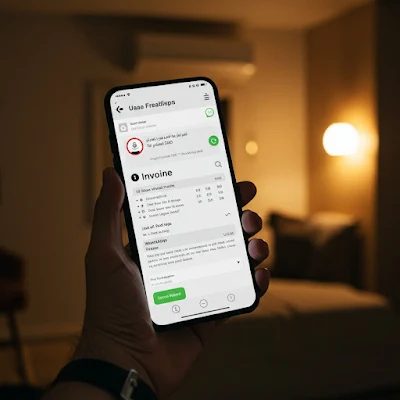Are Instant WhatsApp Invoices the Future for UAE Freelancers?
As freelancers in the UAE navigate tax regulations and fast client expectations, a new trend is emerging: message-based invoicing. Tools like Wafeq, Ziina, and Refrens allow users to send professional, VAT-compliant invoices via WhatsApp and email, reducing delays and boosting efficiency. But how practical is this shift for real-world freelancing?
Why Are UAE Freelancers Embracing WhatsApp and Email for Invoices?
The main appeal lies in speed and client accessibility. Traditional invoice delivery through client portals or downloadable PDFs adds friction. In contrast, WhatsApp and email integrate seamlessly into the communication channels freelancers already use. As ShuraaTax explains, these formats increase the likelihood of immediate action and payment confirmation.
Moreover, in the UAE’s competitive gig economy, being the fastest to issue a clear, formal invoice often translates to faster settlements. Email adds a layer of professionalism, especially for clients who prefer formal documentation, while WhatsApp ensures high visibility and fast client responses.
What Tools Offer WhatsApp-Compatible Invoice Features?
Platforms like Wafeq support Interakt integration, allowing users to automate WhatsApp messages containing invoice links. Ziina, designed for freelancers and small business owners, provides one-click invoice generation and shares payment links via WhatsApp or email. Wave and Refrens offer hybrid methods where freelancers can auto-send invoices with attachments and embedded links.
According to Cygnet One, the rise of modular invoicing tools reflects freelancers’ need for both flexibility and compliance. Wafeq, for example, generates tax-inclusive invoices while embedding them in messages without compromising legal standards.
How Do Messaging-Based Invoices Compare with Traditional Methods?
Conventional invoicing tools like FreshBooks or Zoho Books still dominate larger setups, but they often require the client to log in or download files. This adds steps that can slow down payment. In contrast, WhatsApp or email-based solutions remove those hurdles.
Akaunting reports show that freelancers using message-based invoice delivery have higher client responsiveness and faster invoice clearance. It's not just about sending; it’s about being seen and paid in a timely fashion.
What Are the Trade-Offs of Using Instant Invoice Tools?
Speed is a double-edged sword. While WhatsApp and email-based invoices improve turnaround time, they might lack the full accounting suite some freelancers need. For instance, detailed expense reports, bank integrations, or multi-currency support are often better served by traditional platforms.
Additionally, concerns around client privacy and invoice tracking can arise. Refrens has addressed this by adding PDF download tracking and read receipts on its WhatsApp integration. Still, freelancers dealing with large organizations may prefer sticking with formal email attachments for audit readiness.
Should New UAE Freelancers Start with These Tools?
Absolutely—especially those without complex accounting needs. Tools like Ziina and Wave are free to start and require minimal setup. Their WhatsApp features are ideal for creatives, coaches, or consultants who manage their own schedules and clients.
As their business grows, freelancers can transition to platforms like Wafeq or integrate Ziina with email clients and accounting spreadsheets. The key is to begin with tools that match current volume while preparing for future compliance.
📌 More UAE Tools Freelancers Shouldn’t Miss
If WhatsApp invoicing got your attention, these smart business tools might just make your next breakthrough easier:
- 💼 Top VAT-Compliant Invoicing Tools UAE Freelancers Prefer in 2025
- 🤖 Will the UAE’s AI Cabinet Reshape Business Strategy?
- 🧾 Mastering UAE e-Invoicing: Which ASP-Integrated VAT Tools Freelancers Are Choosing
.jpg)
